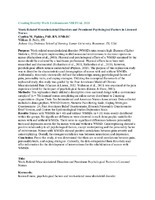Browsing by Author "Pipkins, Cynthia M."
Now showing items 1-6 of 6
-
Effects of aromatherapy on stress levels in BSN students: A pilot study
Pipkins, Cynthia M.; Seaman, J. T.Aromatherapy may have positive effects of increased attention, performance and mental acuity through stimulating the conscious mind. Stress is a common psychological factor affecting physiological factors in nursing students. ... -
Expressive art and stress levels in baccalaureate nursing students: A secondary analysis study
Myers, Jessica N.; Pipkins, Cynthia M. (2017-10-20)Expressive art (EA) is utilized to calm and balance the mind, body, and spirit through enhanced relaxation. Stress is a common psychological factor that affects physiological factors in nursing students. This secondary ... -
Nurse educators, nursing students, and licensed nurses knowledge and attitudes regarding complementary and alternative medicine
Pipkins, Cynthia M.; Cornell, Victoria H.The implementation of Complementary Alternative Medicine (CAM) mirrors the nurses knowledge and attitude regarding various therapies and practices outside of conventional medicine. Despite evidence proving the effectiveness ... -
Psychological factors and work-related musculoskeletal disorders in nurses: A comparative secondary analysis
Perry, William B.; Pipkins, Cynthia M.Work-related musculoskeletal disorders (WMSDs) continue to occur at a high rate in nurses despite various interventions implemented for safe patient handling. Psychological effects of a WMSD sustained are understudied. ... -
Work-related musculoskeletal disorders and prominent psychological factors in licensed nurses
Pipkins, Cynthia M.; Perry, William B.Work-related musculoskeletal disorder (WMSD) rates remain high despite implementing multidimensional interventions to decrease injuries in nurses. Psychological effects of a WMSD sustained by the nurse should be evaluated ... -
Work-related musculoskeletal disorders: Psychological factors in licensed nurses
Pipkins, Cynthia M. (2017-09-15)Licensed nurses complain of pain and leave the profession citing work-related musculoskeletal disorders (WMSD). Psychological factors affect injury response of avoidance or confrontation. Explore the self-reported ...





